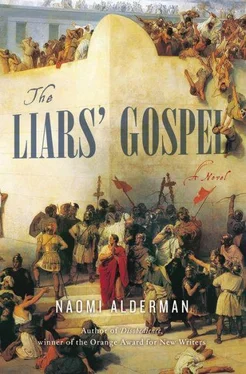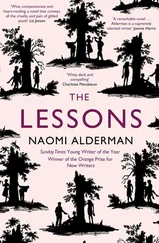Bar-Avo shouts and laughs and grabs his friend’s arm and now they’re off, leaping and running, the blood surging and their limbs singing, and shouting with fear and delight like a toddler chased by a parent pretending to be a monster. They whoop as they scramble over stalls and climb lumber piles, and grab on to roof struts to run along thatch or tile, grabbing handfuls of mud or broken pots to hurl at the soldiers. It is like the feeling when they first held a girl, because even though they had never done the thing before they knew exactly what to do somehow.
Ya’ir is the first one to set a torch of straw and oil aflame and throw it among the soldiers with a jar of oil, which splashes fire onto the men’s legs and feet, causing a great howl. He laughs when he hears the sound, baring his teeth, and the others let out a rallying cry and begin to find flaming things to hurl.
And now it is a running battle on the streets. The soldiers advance, and the boys retreat, but each time they retreat they’ve done a little more damage, and the soldiers are a little more ragged, and the boys are a little deeper into the streets of houses where they’ve known everyone all their lives and anyone would take them in. Bar-Avo and Giora slip through the tiny gap between the house of Shulamit the seamstress and Zakai the spice seller, the gap that doesn’t look like it’s there at all, just wide enough to take their skinny frames, and collapse in the courtyard for a moment, their bodies aching from laughter and fear and exertion all at once.
They climb up onto the roof. Bar-Avo shows his bum to the soldiers. All around the streets, there’s laughter and shouting. From another rooftop, three girls are watching the battle, whispering behind their hands and giggling. The boys fighting down below spot them and play up to it. Giora does a backflip along the street as other boys throw pots and bottles. The girls applaud and shout — commentary to the boys on where the soldiers are coming from, admiration for the acrobatics, anger to the advancing troops.
The thing turns from comedy to violence and back again as swift as a knife. One of those flaming jars of oil hits a soldier — his leg and arm begin to burn and his screams are hideous before his fellows smother the flames with a blanket and even still he whimpers as they carry him off. A red-headed boy is caught by the soldiers and, as he struggles to escape, one of them pulls out a sword and cuts off — somehow, in an awkward close-fought struggle — three fingers of his left hand so he is suddenly howling and bloody.
And yet over here Bar-Avo is clambering between buildings when a goat rushes out from a backyard enclosure, panicking at some small fire, and knocks him to the ground so that his friends laugh and point and howl with mirth. He picks himself up. His pride is a little injured and he makes up for it with a brilliant scheme, luring the soldiers down an alleyway with taunts, then scrambling up the wall with his friends’ help while, from the rooftops, the others pelt them with rotten fruit in a box they’d found left over from the market.
There is no conclusion to the battle. It goes on like this until nightfall, with the soldiers making sudden rushes, capturing a few boys, and the boys throwing stones and sometimes fiery things and sheltering in houses and shouting rude slogans. A storage barn burns and they watch the flames together, fascinated by the slow crumbling tumble of the building folding in on itself. The fighting peters out before dawn, and Bar-Avo has still not been caught.
He has had a good riot. He was one of those young men throwing fire bottles but they did not take him, although a soldier had his leg at one moment and at another he scaled a wall to find on the other side a soldier waiting for him with a red shouting face. He and Giora helped one another escape through a soft place in the roof of a cowshed and then patched it up so that the soldiers who followed them in could not find them. Giora laughed so much that he fell to his knees and almost sank through the roof again.
There were girls watching them, and there was much pretence of protecting them even though the girls could easily have got away, but they nonetheless stayed on that roof, playing at being protected. And after sunset, as the day began to grow dim and the sky was the color of bright blossom shriveling to black and the night sounds of the mountains began to rise up, the soldiers slunk away back to barracks. They were dragging a captive or two but went so sullenly and having taken so little that the boys shouted catcalls behind them and the girls whispered, “You won, you really won.” There were two sets of hands around Bar-Avo’s waist in the dark and two sweet pliant bodies pressed against him and the girls did not seem to mind sharing as the night closed in and their hot mouths found him ready.
That is his first riot, and it seems as far away from death as it is possible for any experience to be. When he wakes the morning after, his head so clear and alive that he feels that God has made the sun rise inside his own skull, he wants to do it again, and again, and again, and wishes with his whole heart that every day would be a day of climbing and shouting and throwing and goats and manure and backflips and oil jars, and that every night could be like the night that has just passed sweet and warm and that every morning for the whole of his life would be like this blue radiant dawn.
He’s been taken notice of already. His cleverness and his daring and his eagerness for the fight — that last one most of all. Men older than him, men who’d kept to the old ways and whose fathers hadn’t given up the battle even when that stone in the wall fell in and the Romans breached the citadel, those men look at the rioters and pick out which ones seem to have something more than the rest.
There is a man, Av-Raham, who sits in the marketplace most mornings, sipping occasionally from a bowlful of smoke. He has a little potbelly and his hair is thin at the crown, but he has a shrewd eye, and men come to him all morning long with questions and requests. He is the one who knows where those cartloads of wheat looted from the Romans ended up. His friends are the people who receive the extra measures of oil which somehow appear when there are bandits in the north. It is he who owns the sharpest swords in Jerusalem, and he to whom one goes if one needs medicine, or aid, or revenge.
They bring Bar-Avo to him the morning after the riot. Bar-Avo is cocky, at least at first. He’s only fifteen and he doesn’t know what he’s doing here. A small corner of him suspects that he’s in trouble. A larger part of him doesn’t care, because last night he had two girls and nothing that happens this morning can ever erase that. He’s still buzzing from the fight.
They’d found him naked under a pile of old sacks, fucking one of those two girls again, his hair a cloud around his face, both of them moving slowly, tired but unable to stop. They’d waited until he was finished and then said, “Av-Raham would like to see you.” And Bar-Avo had taken a swig of water from a jug by his side, swirled it around in his mouth, spat it out into the straw and said, “What if I don’t want to see him?” They had explained most politely that Av-Raham was a good friend to his friends. And, swaggering, Bar-Avo had gone.
There was something he liked about the deferential air surrounding Av-Raham. He couldn’t help imagining how it would feel to be the man whom others talked to in low voices, asked favors of and consulted. He was old — over fifty probably — and not handsome, not like Bar-Avo, but there was something charismatic about him. Over the years Bar-Avo would watch him closely to see how he did it. The formation of the inner circle within his group of followers. The constant denial that he was a man of any importance whatever. The impression that he was holding secrets and that, perhaps, he spoke to God. These are the skills by which a man leads, inspiring both love and fear.
Читать дальше












